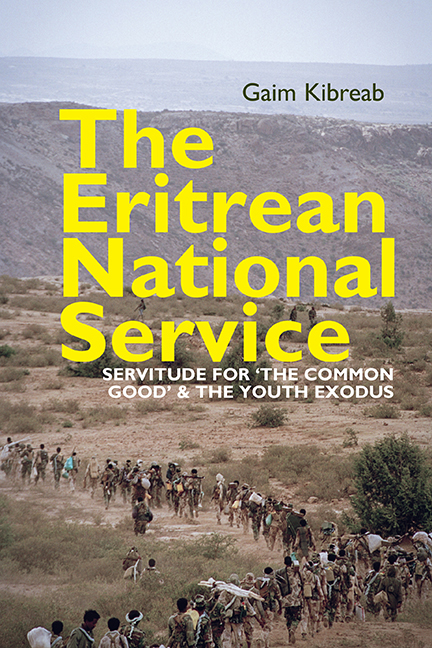Book contents
- Frontmatter
- Dedication
- Contents
- List of Figures and Tables
- Foreword
- Acknowledgements
- List of Acronyms & Abbreviations
- 1 Introduction
- 2 National/Military Service in Africa: Theories and Concepts
- 3 The Government and the Structure of the Eritrean Defence Force
- 4 The Nature of the Eritrean National Service and its Effectiveness as a Fighting Force
- 5 The Eritrean National Service as a Mechanism of Preserving and Transmitting the Core Values of the Liberation Struggle
- 6 The Eritrean National Service: A Vehicle for National Unity and Cohesion
- 7 The Eritrean National Service and Forced Equality
- 8 The Overarching Impact of the Eritrean National Service on the Social Fabric of Eritrean Society
- 9 Impact of the Open-Ended Eritrean National Service on Families and Conscripts
- 10 Conclusion
- Postscript: The UK Upper Tribunal (Immigration and Asylum Chamber) Country Guidance on Eritrea
- References
- Index
- Miscellaneous Endmatter
2 - National/Military Service in Africa: Theories and Concepts
Published online by Cambridge University Press: 11 August 2017
- Frontmatter
- Dedication
- Contents
- List of Figures and Tables
- Foreword
- Acknowledgements
- List of Acronyms & Abbreviations
- 1 Introduction
- 2 National/Military Service in Africa: Theories and Concepts
- 3 The Government and the Structure of the Eritrean Defence Force
- 4 The Nature of the Eritrean National Service and its Effectiveness as a Fighting Force
- 5 The Eritrean National Service as a Mechanism of Preserving and Transmitting the Core Values of the Liberation Struggle
- 6 The Eritrean National Service: A Vehicle for National Unity and Cohesion
- 7 The Eritrean National Service and Forced Equality
- 8 The Overarching Impact of the Eritrean National Service on the Social Fabric of Eritrean Society
- 9 Impact of the Open-Ended Eritrean National Service on Families and Conscripts
- 10 Conclusion
- Postscript: The UK Upper Tribunal (Immigration and Asylum Chamber) Country Guidance on Eritrea
- References
- Index
- Miscellaneous Endmatter
Summary
This chapter presents different theories and perspectives on national service. It also briefly discusses the philosophical foundations of national/ military service. Some analysts perceive compulsory and universal national service as the ultimate good, benefitting not only conscripts, but also the whole society where such a policy exists. Others view compulsory national service as the antithesis of a free society, because citizens are forced to relinquish their freedom in order to perform the obligation. The exponents of the latter school of thought equate compulsory national service with forced labour or a modern form of slavery. Some analysts also equate compulsory national service with the feudal institution of posse comitatus (the inherent power of the state to call upon its physically fit citizens to serve their country).
Opinions among political theorists and other analysts are so divided that no other topic in social and military history is probably as controversial, and perhaps none arouses such strong feelings of sympathy or antipathy as that of compulsory military and/or national service. Scholarly opinions on national/military service are fervently divided into two mutually opposed schools of thought. One perceives national/military service as a civic duty and as an expression of political and civic rights, which create and reproduce values that are amenable to greater cross-cultural understanding, mutual respect, national unity and greater commitment to the common good. The prominent exponents of this school of thought postulate that well thought out national service programmes engender democratic values, promote good citizenship, national cohesion, a common sense of purpose, mutual trust and commitment to the common good. These values are said to be valuable to the national community and to the individual participants themselves. The latter is said to be due to the changes and transformations servers are expected to undergo as a result, as well as the fundamental contributions they are likely to make to their national communities.
The other school of thought perceives compulsory national/military service as antithetic to a free society, because individuals are forced against their will to undertake compulsory national/military service at the cost of their interests and future careers.
- Type
- Chapter
- Information
- The Eritrean National ServiceServitude for 'the common good' and the Youth Exodus, pp. 22 - 35Publisher: Boydell & BrewerPrint publication year: 2017

